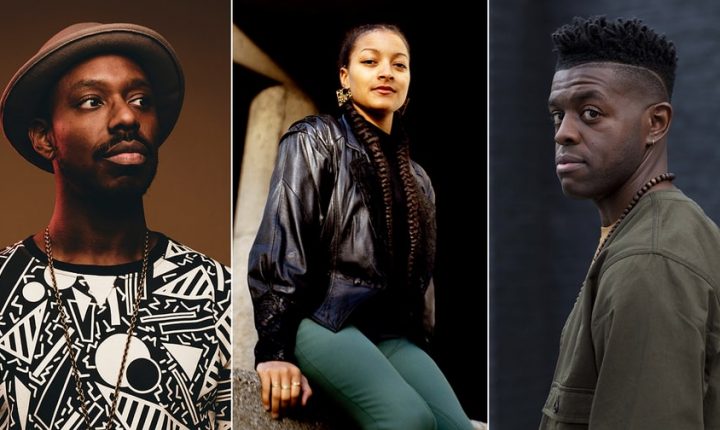
Various Artists, We Out Here | *** 1/2
Nubya Garcia, Nubya’s 5ive | ****
Ashley Henry & the Re:Ensemble, Easter EP | *** 1/2
The question of who will “save” jazz – a music that celebrated a century on record in 2017 – is one that gets a new answer every few years. The cycle goes like this: A flashy award, a pop cosign, a high-profile collaboration or some intangible sense of “relevance” suddenly brings an artist like Esperanza Spalding, Robert Glasper or Kamasi Washington to the attention of the mainstream. All while conventional mass media – La La Land, Drew Brees’ FedEx commercial – continues to paint the music as difficult or alienating.
That’s not the case with London’s vibrant jazz scene, now reaching a zenith after years of steadily growing in global audience. We Out Here, a new nine-track compilation from taste-making DJ Gilles Peterson’s Brownswood Recordings, offers a helpful primer on the community’s main players. Tenor player Shabaka Hutchings, who is the compilation’s musical director and plays bass clarinet on the driving, dissonant “Black Skin, Black Masks,” is at the center of the movement’s stateside crossover. His muscular, urgent, raw sound fuels music that ranges from the frenetic spiritual jazz crescendos of Shabaka and the Ancestors to the deeply danceable, Afrobeat- and grime-inflected jams of his two-drummer quartet Sons of Kemet.
Both projects, like the music on Kamasi Washington’s 2015 breakthrough The Epic, feel tailor-made for festival audiences looking for a combination of groove and ever-ascending musical crescendos. Hutchings’ dynamic style is particularly captivating live: He’s a tireless performer, and one who simultaneously taps into social justice themes and pop music crossover without ever departing from the jazz idiom. Naturally, Shabaka and the Ancestors and Sons of Kemet signed with storied jazz label Impulse!, longtime home of the tenor saxophone’s most famous proponent, John Coltrane.
Sons of Kemet also stars tuba virtuoso Theon Cross, whose We Out Here contribution “Brockley” could easily be sampled for a fiery Skepta track. He goes head to head with tenor player Nubya Garcia and drummer Moses Boyd on a grime-y, stripped-down jazz piece that would be at home on a Trinidadian Carnival parade float. Boyd and Garcia also contribute to the compilation as bandleaders, Boyd with fusion jam “The Balance” and Garcia with the soaring “Once.” As a collaborator and bandleader Boyd’s relentless beats betray his cross-genre literacy: His work with all corners of the London scene shows equal skill with afrobeat, house and swing. His January single alongside saxophonist Binker Golding, “Children of the Ultra Blacks,” is an explosive live funk track that features what can only be described as “hip-hop harp.”
But it is Garcia’s solo debut, Nubya’s 5ive, that shows what really makes the London scene distinct from most of its American counterparts: a holistic embrace of women as bandleaders and instrumentalists. Garcia is just one of a legion of women who are fully integrated into the U.K. jazz community, including saxophonist Camilla George, vocalist Zara McFarlane and trumpeter Yazz Ahmed. 5ive is remarkable, an intoxicating combination of vibrant soloing and stay-in-your-head hooks: At a recent set during New York’s Winter Jazzfest, Garcia had a sold-out crowd whooping with recognition when she played first riff on the album’s opener, “Lost Kingdoms.” Backed by Boyd and Cross along with pianist Joe Armon-Jones and bassist Daniel Casimir, Garcia produces jazz-funk that’s imminently listenable – if there’s one jazz musician poised to break out in 2018, it’s her.
Garcia is also a member of an all-woman collective called Nerija, whose self-titled, self-released 2016 EP offers a breezy combination of jazz, funk and afrobeat. It’s party music that never loses its improvised edge, a turn-up record for the coffeehouse set – Little Simz booked them to perform at the Roundhouse Rising Festival last year. Trumpeter Sheila Maurice-Grey, saxophonist Cassie Kinoshi and trombonist Rosie Turtonhe round out the horn section, creating warm harmonies that give the project big-band flair. The production on the Nerija project, along with most of the other releases mentioned here, is pleasantly rough around the edges, which gives it all a spontaneous edge. This particular crew of U.K. jazzers seems to understand that leaving their records a little unpolished makes them transporting, not messy.
Pianist Ashley Henry is much more indebted to American contemporary jazz than most of the other Brits mentioned here, and more tied to hip-hop than dancehall or grime. He covers Nas’ “The World Is Yours” on his Easter EP, perfect for those missing Robert Glasper’s Dilla days, turning the hip-hop classic into a dynamic romp. But the album is far from one-note: Henry also does a driving, almost bop-ish take on “Pressure,” from U.K. indie rock trio the Enemy. If he’s not reinventing the groove-jazz wheel, he’s at least putting a fresh spin on it.
All of these artists – and much of the other improvised music coming out of the U.K. – share a sense of urgency, spontaneity and, frankly, fun that sets their music apart from crossover-ready jazz stateside. In London, musicians have created a jazz community that offers access and support to anyone who can blow, regardless of their background. And as it turns out, the music is that much better as a result.